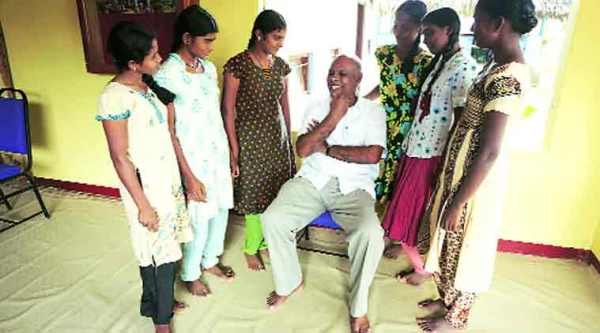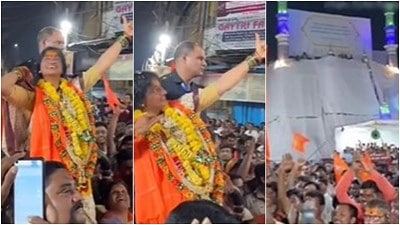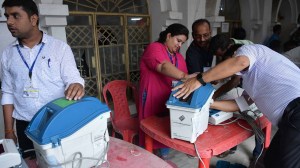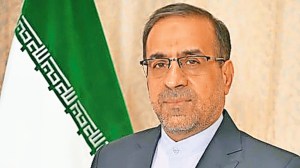- India
- International
Govt says he fled but KP is in Jaffna, says healing has begun
KP was on most-wanted list of Interpol and CBI after Rajiv Gandhi assassination, was arrested from a hotel in Kuala Lumpur in May 2009.
 KP at one of the children’s homes he runs for war orphans in Kilinochchi. Arun Janardhanan
KP at one of the children’s homes he runs for war orphans in Kilinochchi. Arun Janardhanan
Almost five kilometres after Kilinochchi town, on the Jaffna-Colombo A9 highway, a small arterial road turns left to Iranamadu Kulam, once an LTTE stronghold known for its huge water body and an airstrip that fell in 2009, towards the end of the war that wiped out the LTTE. The Iranamadu airstrip played a vital role in connecting north Sri Lanka, under the control of LTTE, with other countries.
On the right of the road are army settlements — “Troops ahead, reduce the speed,” say the signboards. On the left are lush paddy fields and vegetable farms. Roughly about 300 yards away is a weathered signboard of a children’s home, Chencholai.
A day after the spokesperson of newly-elected Sri Lankan President Maithripala Sirisena claimed that Kumaran Pathmanathan, alias KP, had fled the country following the defeat of former President Mahinda Rajapaksa, The Indian Express met KP at a small village near Kilinochchi, at one of the children’s homes he runs for war orphans.
Clad in a white shirt and grey pants, with some ‘vibhuti’ visible on his forehead, he wore a peaceful countenance, with no hint whatsoever of his turbulent past as one of the top leaders of the Tamil Tigers. His actual name is Selvarasa Pathmanathan, but he is widely known as Kumaran Pathmanathan or KP in the mainstream media — a name that was on one of the fake passports that he used to fly across continents at the peak of the Lankan conflict, procuring arms and ammunition for the LTTE.
KP, who was on the most-wanted list of the Interpol and CBI after the Rajiv Gandhi assassination, was arrested from a hotel in Kuala Lumpur in May 2009, immediately after the Lanka conflict ended. After serving time in Colombo until 2012, he was shifted to Kilinochchi, the former LTTE stronghold near Jaffna in the north, where he opened his first children’s home in January 2013. He now lives in protected custody in a single-room shelter inside a military settlement here.

KP spends his days with the children, telling them stories of world leaders and philosophers — but none about Velupillai Prabhakaran. “I just finished reading Becoming Enlightened by His Highness the Dalai Lama. One of my friends bought it and sent it to me by post. I do read whenever I get time,” he says. “Besides biographies and autobiographies, I read Buddha and Gandhi too,” he says. There are statues of Buddha and Saraswati outside his office room.
Escorted by four guards, KP receives his visitors, under a small facility with thatched roof. Some women have come to visit the children. There is also an official representing the child rights department.
While he looks away from the camera with a self-effacing smile, the children gather around him, calling him “Appa” (father in Tamil). Bhanu, 5, says KP is her Appa. She adds that he never scolds her. “For children, he is like their father. And a teacher for us,” says one of the 15 staff members employed at Chencholai.
At first glance, it is difficult to believe that he once wielded wealthy gold accounts and dozens of vessels of the powerful LTTE. The LTTE literature refers to a “KP Department” — an international department that he ran single-handedly, from Maldives, Mumbai, Thailand, Malaysia and different parts of Europe.
The latest regime in Sri Lanka has alleged a nexus between KP and Rajapaksa — the latter is reported to have ensured that KP escaped prosecution in return for disclosure of closely guarded secrets on LTTE wealth. Rajapaksa’s rivals believe that he still handles at least half-a-dozen merchant vessels owned by the LTTE. There are reports that KP may be arrested and prosecuted soon.
The man who talks like a philosopher is still considered a traitor by many. “Anything can happen anytime in our life,” he says, with a smile. Asked about the latest election results, he says, “I am doing something good here (for the children). I do hope to continue this work… I do have hope. Everything was for the good.”
Chencholai — the name brings up memories of the Chencholai bombing that killed 61 children in an aerial operation by the Sri Lankan Air Force on a children’s home on August 14, 2006 — ostensibly houses children who are either orphans or homeless. All have a story to tell, though they are loathe to recall them. While Chencholai has 115 girls, aged between five to 18 years, another home, Bharathi Illam at Mullaitivu — one of the worst affected areas in the last leg of the war — has 110 boys. A third home is now being built near Kilinochchi town.
A Commerce graduate from Jaffna University, KP takes the children for farming lessons too. A small paddy field behind Chencholai produces almost half of the rice needed for the shelter, and a small quantity of vegetables. “We have an organic farm,” says KP.
While most of the children study at a school in the neighborhood and take the bus to commute, an auto-rickshaw is ready by noon to pick up those who go to the nursery school.
At 60, KP has to take two insulin shots a day to keep his diabetes in check. He is also under medication for cardiac problems. His family is in Thailand, where his daughter is studying. “It will take time to heal wounds. But it has begun now. Reconciliation is the only solution. Time will heal. We are all working for that only, aren’t we,” he says.
Asked how he spends his time, he says he reads a lot, but rarely steps out. Looking away, after a long pause, he adds that he sheds tears too at times, when he is alone.
Apr 18: Latest News
- 01
- 02
- 03
- 04
- 05






































